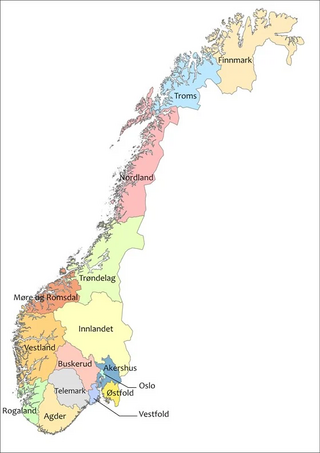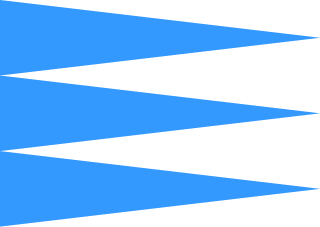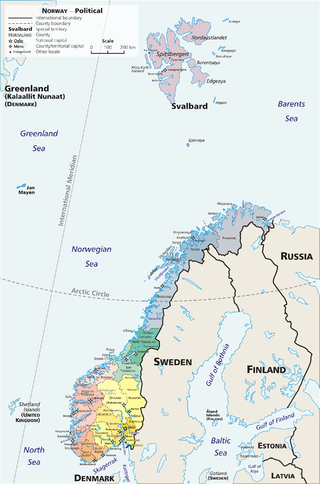
Telemark is a county and a current electoral district in Norway. Telemark borders the counties of Vestfold, Buskerud, Vestland, Rogaland and Agder. In 2020, Telemark merged with the county of Vestfold to form the county of Vestfold og Telemark. On 1 January 2024, the county of Telemark was re-established after Vestfold og Telemark was divided again.

Vinje is a municipality in Telemark county, Norway. It is located in the traditional district of Vest-Telemark which is part of Øvre Telemark. The administrative centre of the municipality is the village of Åmot. Other villages in the municipality include Arabygdi, Edland, Grunge, Haukeli, Krossen, Møsstrond, Nesland, Øyfjell, Raulandsgrend, and Vinje.
Bø may refer to the following:

Norway is divided into 15 administrative regions, called counties which until 1918 were known as amter. The counties form the first-level administrative divisions of Norway and are further subdivided into 356 municipalities. The island territories of Svalbard and Jan Mayen are outside the county division and ruled directly at the national level. The capital Oslo is both a county and a municipality.

Norwegian dialects (dialekter) are commonly divided into four main groups, 'Northern Norwegian', 'Central Norwegian' (trøndersk), 'Western Norwegian' (vestlandsk), and 'Eastern Norwegian'. Sometimes 'Midland Norwegian' and/or 'South Norwegian' are considered fifth or sixth groups.

Vest-Telemark is a traditional district in Norway. The 7,699-square-kilometre (2,973 sq mi) area comprises the western areas of the larger region known as Upper Telemark in Vestfold og Telemark county. The region consists of six municipalities: Fyresdal, Tokke, Vinje, Nissedal, Kviteseid, and Seljord. In 2020, there were 13,903 residents in the region. The area of Vest-Telemark was historically called Øvre Telemark vestfjelske.

Most of the Norwegian counties and municipalities have their own flag. They are based on the respective coat of arms of the subdivision. However they are seldom used. Most public buildings and private homes use the National flag. Note: As of 2020, many municipalities and counties have been merged. Because of this many of the new regions do not have a current flag and instead the coat of arms will be used for the new regions until a flag is made.
This is an incomplete list of Norwegian coats of arms. Today most municipalities and all counties have their own coats of arms. Many Norwegian military units and other public agencies and some private families have coats of arms. For more general information see the page about Norwegian heraldry.
Sandøya or Sandøy may refer to:
The following are lists of county governors of the various counties of Norway. The Norwegian counties are under the supervision of county governors, appointed by the Norwegian government. Historically, there were larger diocesan counties that supervised smaller subordinate counties as well. This distinction was abolished on 1 January 1919. On 1 January 2020, there was a major reorganization and reduction of counties in Norway.

Vinje is a dispersed settlement north of Dolsko in the Municipality of Dol pri Ljubljani in the southeastern part of the Upper Carniola region of Slovenia.

Norway is commonly divided into five major geographical regions. These regions are purely geographical, and have no administrative purpose. However, in 2017 the government decided to abolish the current counties of Norway and to replace them with fewer, larger administrative regions. The first of these new areas came into existence on 1 January 2018, when Nord-Trøndelag and Sør-Trøndelag merged to form Trøndelag.
Åsmund or Aasmund is a Norse male given name, derived from as ('god') and mundr ('protector'). People with the given name Åsmund or Aasmund include:
Bratsberg is a name of Norwegian origin and may refer to:

Local elections were held in Norway on 9 September 2019. Voters elected representatives to municipal and county councils, which are responsible for education, public transport, health, and elderly care, and for the levy of certain taxes.
This page is based on this
Wikipedia article Text is available under the
CC BY-SA 4.0 license; additional terms may apply.
Images, videos and audio are available under their respective licenses.








